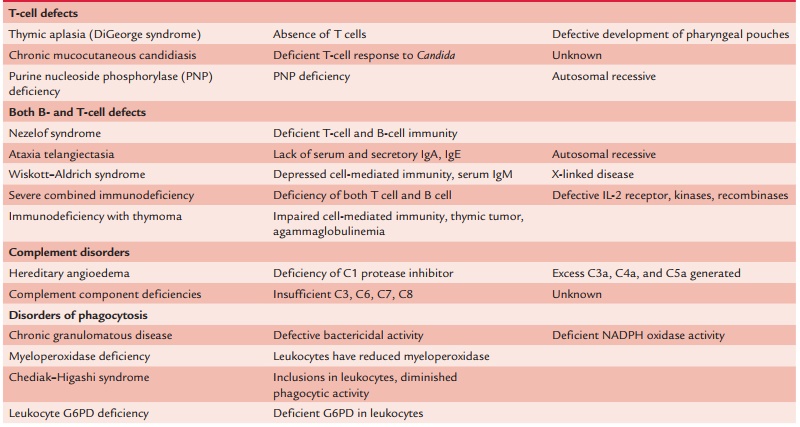Chapter: Microbiology and Immunology: Immunodeficiency
Secondary Immunodeficiencies
Secondary Immunodeficiencies
Secondary immunodeficiencies occur secondary to numerous diseases or conditions, or as a consequence of therapeutic mea-sures that depress the immune system. Most immunodeficient patients have secondary forms of immunodeficiency, caused by either pathological conditions that affect the immune system or the administration of therapeutic compounds with immunosuppres-sive effects. By far, the most common secondary immunodeficiency is acquired immunodeficiency syndrome (or AIDS), which results from infection with the human immunodeficiency virus (HIV).
Secondary immunodeficiencies are more common than primary immunodeficiencies and include AIDS, chemotherapy by immunosuppressive drugs (e.g., corticosteroids and nonsteroidal anti-inflammatory drugs), psychological depression, burns, radiation, Alzheimer’s disease, celiac disease, sarcoidosis, lymphoproliferative disease, Waldenstrom’s macroglobulinemia, multiple myeloma, aplastic anemia, sickle cell disease, malnutrition, aging, neoplasia, diabetes mellitus, and numerous other condi-tions. Secondary immunodeficiencies may be categorized as
(a) B-cell deficiencies,
(b) T-cell deficiencies,
(c) complement deficien-cies, and
(d) phagocytic deficiencies as follows:
B-Cell Deficiencies
◗ Common variable hypogammaglobulinemia
This condition is caused due to a defective T-cell signaling resulting in failure to produce IgG in the body. This occurs in persons between the ages of 13 and 35 years. In this condi-tion, the number of B cells is normal, but the ability to pro-duce IgG and other immunoglobulins is greatly reduced. The cell-mediated immunity is normal. Patients with this condition are highly susceptible to infections caused by S. pneumoniae, H. influenzae, and other pyogenic bacteria. Administration ofintravenous gamma globulin reduces the infections caused by these bacteria.
◗ Malnutrition
In malnutrition, the synthesis of IgG is reduced due to low sup-ply of amino acids. People with malnutrition, hence, are sus-ceptible to infection by pyogenic bacteria.
T-Cell Deficiencies
◗ Acquired immunodeficiency syndrome (AIDS)
Patients with AIDS caused by HIV are highly susceptible to infection by many opportunistic pathogens including bac-teria, viruses, fungi, and parasites. This is attributed to the loss of helper T-cell activity. The virus specifically infects and kills the cells bearing CD4 surface receptors. The immu-nity is highly suppressed, and failure of immune surveil-lance leads to a high incidence of tumors.
◗ Measles
T-cell function is altered, but immunoglobulins are normal in patients suffering from measles. Patients show a temporary suppression of delayed hypersensitivity.
Complement Deficiencies
◗ Liver failure
The synthesis of complement proteins is very much reduced in chronic hepatitis B or C and in liver failure caused by alcoholic cirrhosis. Hence, these patients are highly susceptible to infection by pyogenic bacteria.
◗ Malnutrition
In severe malnutrition, the synthesis of complement proteins by liver is reduced due to low supply of amino acids. Therefore, people with malnutrition are susceptible to infection by pyo-genic bacteria.
Phagocyte Deficiencies
◗ Neutropenia
The condition is characterized by a low neutrophil count (less than 500/mL), caused commonly by cytotoxic drugs, such as those used in cancer therapy. The patients are susceptible to severe bacterial infections caused by pyogenic bacteria, such as S. aureus and S. pneumoniae. Immunodeficiency diseases havebeen summarized in Table 18-1.


Related Topics